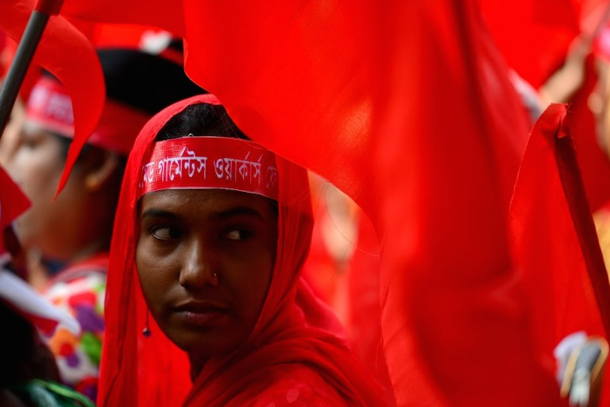Corrupt recruiting cartel of 10 agencies that overcharged workers blamed for cessation of G2G Plus deal with Malaysia

A Bangladeshi worker looks on as she attend a procession to mark May Day or International Workers’ Day in Dhaka in this May 1, 2017 file photo. Activists around the world mark international workers’ day with marches demanding better working conditions, more jobs and higher wages. (Photo by AFP)
Bangladeshi activists have called to end corruption in the process of recruiting people to work overseas after Malaysia suspended a labor deal over allegations of monopoly, syndication and over-charging by a group of recruiting agencies.
Malaysia’s Home Ministry issued a letter on Aug. 21 announcing that it would no longer be hiring workers from Bangladesh under the controversial government to government plus (G2G Plus) system, due to the harmful practices of a cartel of 10 Bangladeshi recruiting agencies.
The decision was approved at a high-level meeting chaired by Malaysian Prime Minister Mahathir Mohammad on Aug. 14.
It said the recruitment of migrant labor from Bangladesh would be postponed from Sept. 1 but those workers who had already registered and been approved to work in Malaysia would still be granted entry.
Mahathir reportedly wants to introduce a new, fairer system as the cartel has been accused of cheating poor workers by charging exorbitant migration fees in blatant violation of the rules.
He told a news conference in Kuala Lumpur in early August that the cartel’s stranglehold had to be broken by fostering more competition.
“We want to open up to all the agents there to allow competition,” he told the media, as reported by New Age Bangladesh.
Under the G2G Plus deal, signed in 2015, Bangladesh was expected to send 1.5 million workers to Malaysia via an online registration system over a three-year period.
Aspiring migrant workers were asked to pay 36,000 Taka (US$424) to register, and private recruiting agencies were allowed to take part in the process.
Labor advocates expected the deal would help curb illegal migration and human trafficking, which led to the 2015 Asian boat people crisis.
Those tragic events in 2015 saw thousands of Bangladeshis and Rohingya refugees illegally smuggled to Malaysia and Thailand. Many were left adrift at sea after both countries launched a crackdown on human trafficking.
Earlier this year, Malaysian authorities launched investigations into the recruitment process after media from both countries reported on worrying anomalies.
A Bangladeshi businessman with political connections to Malaysia’s Home Ministry allegedly runs the cartel. Since 2016, it has sent 200,000 workers to the Southeast Asian nation, Malaysia’s The Star reported in June 22.
The agencies have been charging workers 400,000 Taka (US$ 4,706) to find a placement, or about 10 times the originally agreed upon sum. Half of the money is reportedly funneled to the syndicate kingpins in both countries, the daily reported.
In a statement, a local chapter of the Berlin-based anti-graft watchdog Transparency International (TIB) called for a probe into corruption and demanded these unscrupulous agencies be punished accordingly.
“The government is supposed to be aware of the operations and influence of the syndicate members responsible for this situation. But they have remained beyond reach,” Transparency International Bangladesh (TIB) executive director Iftekharuzzaman said on Aug. 26.
The suspended G2G Plus deal should be seen as a wake-up call to end this unfair monopoly and corruption in the labor sector, he said.
“TIB thinks this is the right time for the government to prove its political and administrative goodwill,” he added.
Shariful Islam, who runs the migration program at BRAC, a leading Bangladeshi development agency, says this has caused suffering and huge financial losses for workers.
“They were forced to pay six to eight times above the fixed amount, which meant they had to work extremely hard just to repay that. Many had to borrow money or sell their properties [just to afford the recruitment process],” Hasan told ucanews.com.
Nonetheless, the suspected deal comes as bad news for workers who are desperate to earn higher wages overseas and could rekindle illegal and risky migration channels, he said.
“The two governments need to work together to find a solution and revive the system for good,” he added.
Malaysia has not suspended the entire deal but only the online registration process, said Salim Reza, director-general of Bangladesh’s state-run Bureau of Manpower, Employment and Training.
“Malaysia is considering recruiting workers directly instead of online,” he said, adding that if Mahathir presses ahead with this the adverse impact on migrant labor could be minimal.
“Also, if we receive written complaints about syndication in the recruitment process, we will take [legal] action against them,” he said.
Benjir Ahmed, president of the Bangladesh Association for International Recruiting Agencies, declined to comment on the matter when contacted by ucanews.com.
